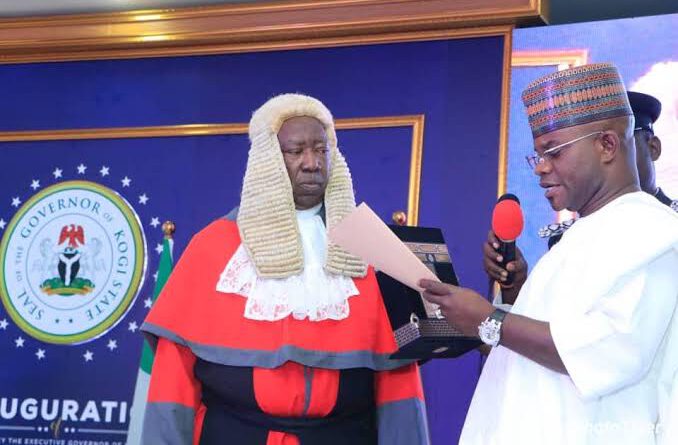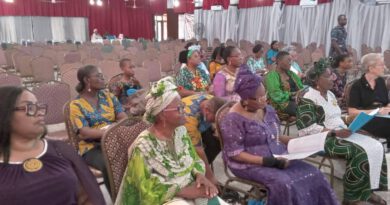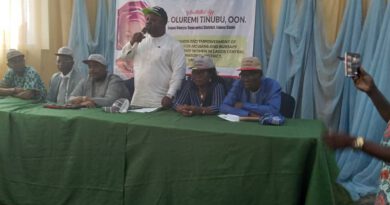Yahaya Bello: EFCC, lawyers and Nigerians
By Ola Abdul-Fatah
The Yahaya Bello case has become another classic example of the difficulty anti-graft agencies in Nigeria face in prosecuting Politically Exposed Persons (PEPs).
For months, the Economic and Financial Crimes Commission (EFCC) has tried without success to get Bello to appear in court and respond to allegations he looted N192 billion from the Kogi State treasury.
Bello has protested his innocence, but he has done so only through his lawyers, who – not being the defendant – cannot stand in his stead, while the suspect remains in hiding.
This should ordinarily place a heavy legal and moral burden on him to attend his trial and be vindicated, or, if he is found guilty, to face the consequences.
It should also interest the public to see a judicial end to the matter, but, sadly, not everyone sees things this way.
Incredibly, some of them seem to be lawyers. No fewer than 500 persons who claimed to be legal practitioners from across the country on Monday, April 22, 2024, stormed the Supreme Court complex.
Campaigning under the aegis of judicial watchdogs, they faulted the siege on the ex-governor’s residence, in a bid to arrest him, saying there was a valid court order to the contrary, which had not been vacated.
Thankfully, the Nigerian Bar Association (NBA) questioned the identity of the supposed lawyers, insisting that this group of persons could not have been lawyers
We are living in interesting times and, just like the “fake?” lawyers, some Nigerians do not seem to understand why it is important for a PEP accused of monumental fraud to pass through the justice system.
This was perhaps why they sneered when, in April, the Chairman of the Economic and Financial Crimes Commission (EFCC) Ola Olukoyede vowed to resign if the embattled former governor, is not prosecuted.
In their view, Olukoyede had spoken out of turn, and he should have – in the Nigerian manner – gone hush on the matter and not taken Bello’s matter personally.
They apparently did not see what Olukoyede saw. And it was not just the mindboggling money laundering charges, some of which had yet to be made public against the self-styled “White Lion” at the time, or the quantum of evidence the Commission’s boss believed EFCC investigators had in support of the charges.
They did not understand – like Olukoyede, a thorough anti-fraud lawyer, did – the implications for a PEP to evade prosecution.
PEPs are persons who hold or held public positions in government and as a result are susceptible to committing financial crimes such as bribery and corruption, money laundering and sponsoring of terrorism.
Bello is not just a PEP, but also a high-risk one, by virtue of his status as a former state executive. High-risk PEPs are people who present a particularly elevated threat to the financial system of a country or the world by the position they occupy or influence.
PEPs often have access to substantial amounts of wealth and, in Nigeria, are often accused of leveraging their positions of power to engage in financial crime. One consequence of this is that businesses are put at risk of inadvertently facilitating money laundering or other criminal activities, which can result in severe financial and reputational damage.
They are sometimes untouchable because their illicit wealth enables them to find their way around law enforcement, judicial, political or economic systems, etc.
There have been several examples. On 12 December 2007, then Delta State governor James Ibori was arrested by the EFCC on charges including theft of public funds, abuse of office, and money laundering. Then EFCC Chairman and anticorruption czar Nuhu Ribadu alleged that Ibori attempted to bribe him to drop the charges with a whopping cash gift of $15 million. But on 17 December 2009, a Federal High Court sitting in Asaba, Delta State, discharged and acquitted Ibori of all 170 charges of corruption brought against him by EFCC. It took a complex collaboration between Nigeria and the United Kingdom for Ibori to be arrested in 2010, in Dubai, United Arab Emirates under Interpol arrest warrants. Ibori’s case and extradition to London became one of the longest, most complex and expensive operations mounted by Scotland Yard in recent years. In February 2012, accused of stealing $250 million from the Nigerian public purse, Ibori pleaded guilty to ten counts of money laundering and conspiracy to defraud at Southwark Crown Court, London and was sentenced to 13 years imprisonment.
Whether Bello is innocent or guilty is not even the issue. PEPs are not “ordinary” citizens. If a country or its economy fails, it is often because its PEPs have failed.
Passing a PEP through an impartial justice system, whether he is found guilty or returned innocent, strengthens the judiciary in the eyes of the people. It gives the people confidence in the anti-graft agencies. It renews their faith that the system works, and no man is above the law.
By playing hide and seek with his trial, Bello must realise that he runs the risk of unwittingly weaking the justice system of the country he claims he loves.
He is also denying the good people of Kogi their right to justice. They must want to know whether, indeed he looted their N80,246,470,089.88k(N80.25 billion) and another N110,446,470,089.00 from the state’s treasury during his eight-year tenure from 2016 to 2024. This last allegation brings the total fraud charge against Bello to N192 billion. Kogi State’s 2024 budget is N258.2 billion.
In this light, Nigerians owe a duty to back the EFCC to unravel this mystery in the interest of Kogi people and every other Nigerians. We must demand that Bello quit his games and, like the lion he says he is, come out and face his charges.




